Material Collection
Flooring
It is hugely important to consider alternatives to vinyl (known more commonly as "PVC") flooring for a myriad of reasons. Firstly, as chlorine molecules are heated to high temperatures during the manufacturing, burning, and landfilling of PVC, a type of highly toxic chemicals known as dioxins are released. Dioxins not only persist in the body for years after exposure, but with links to cancer, reproductive disorders, and hormone disruption, they have been called the most toxic man-made substance ever created. PVC floors also contain phthalates, which are endocrine disruptors.
It is important that designers seek healthier alternatives in linoleum, cork, natural rubber, or bio-based materials that avoid any inclusion of vinyl.
Below are a few examples of flooring that meet our rigorous evaluation. For further help on your own search for healthier flooring, scroll down to "Spec Guidance”.
Flooring
19 products
About Our Collections
The goal of our collections is to help promote transparency in the material ingredients of building products by fostering knowledge and awareness of products and materials for which life-cycle information is available, and that have environmentally, economically, and socially preferable life-cycle impacts.
Keep an eye out for the following symbols:
A Healthier Affordable Building Product
Products with the designation of "Healthier & Affordable" were specified and installed in at least one of our Case Studies of healthier affordable housing.
Available at the Donghia healthier Materials Library
The Donghia healthier Materials Library library is open to Parsons student and faculty. Learn more about access and opening hours here.
Low Embodied Carbon
“Embodied Carbon” is the total amount of carbon emitted during the process of making a material. *HML refers to a manufacturer's EPD to determine whether a product's A1-A3 carbon emissions falls within HML's threshold for Low Embodied Carbon.
New Product
This product has been added to the collection within the past six months.
Product in Development
Products with this designation identify they are currently scaling or only available in markets outside of the building industry. they could be experimental or in use in capsule collections.
Available in the EU
Products with this designation are currently available only in the European Union and identified as being an exemplary healthy option in the respective product group.
Ingredient Disclosures
There are several ways of evaluating a material’s health that we include with product information. Disclosures are reports by manufacturers about product ingredients, impacts, or other attributes.
Key Disclosures include:
Health Product Declaration (HPD)
A voluntary technical specification for reporting information on product contents and associated health information, intended to be the health-analogue to Environmental Product Declarations (EPDs).
Declare Label
Declare is a transparency platform and product database that answers three questions:
1. Where does a product come from?
2. What is it made of?
3. Where does it go at the end of its life?
Environmental Product Declaration (EPD)
A standardized format for communicating the environmental effects associated with a product’s raw materials extraction, energy use, chemical makeup, waste generation, and emissions to air, soil, and water.
Safety Data Sheet (SDS)
A reporting format that provides basic information about a material’s chemical ingredients, the potential safety hazards to installers, and recommended practices for installation.
USDA Certified Biobased Product Label
Managed by the U.S. Department of Agriculture (USDA), the goal of the BioPreferred Program is to increase the purchase and use of biobased products.
Other
| Manufacturer | Product | Ingredient Disclosures |
|---|---|---|
| Forbo Flooring Systems | Marmoleum Modular |
Marmoleum ModularUsed in Healthier Affordable HousingAvailable At the Donghia Materials LibraryLow-Embodied Carbon MaterialMarmoleum Modular tiles are made from natural materials. The product has a low carbon footprint, and is free from toxic materials such as phthalates. The modular tiles allow you to mix and match to design a unique floor surface. Per Forbo's product-specific EPDs, these Marmoleum flooring system meets HML's criteria for low embodied carbon. It contains 100% Biobased Content and has been awarded the USDA Certified Biobased Product Label in the BioPreferred® Program. CategoryResilient, LinoleumManufacturerForbo Flooring Systems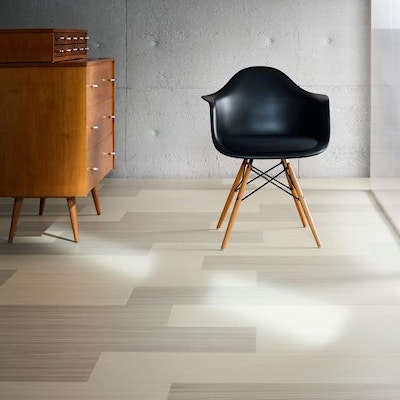
Material composition*Linseed Oil 20%, Gum Rosin 2%, Tall Oil 6%, Wood Flour 31%, Calcium Carbonate 8%, Reused Marmoleum 23 %, Titanium Dioxide 3%, Various other pigments 1%, Polyester 5%, Lacquer 1% *as reported by the manufacturer AVAILABLE SIZING9.8”x 9.8”, 9.8”x 19.69” and 19.69”x 19.69” Tiles COLORSAvailable in a variety of colors CERTIFICATIONS & DISCLOSURES
Health Product Declaration (HPD)
Declare Label
Environmental Product Declaration (EPD)
Safety Data Sheet (SDS)
USDA Certified Biobased Product Label
Other
Declare | Red List Free
Contributes to LEED credits
USDA Certified Biobased Product Label
Additional DocumentsLast UpdatedApril 01, 2024 |
| Kährs | Multi Layer Flooring |
Multi Layer FlooringUsed in Healthier Affordable HousingAvailable At the Donghia Materials LibraryLow-Embodied Carbon MaterialKährs's 3-layer engineered hardwood flooring is made up of a surface layer, a core layer, and a backing. Surface treatments are free from solvents, formaldehyde and isocyanate. Engineered hardwood allows a floating installation on a level surface. This allows you to avoid potentially harmful adhesives and enables future disassembly and reuse. The AWARE collection is bio-based, PVC-free, and can be sanded/refinished to allow for a longer lifespan. *NOTE: This product is ULEF as opposed to NAF, meaning it contains ultra-low emitting formaldehyde. The products carry FloorScore emissions certification. Per Kahrs's EPD, this product meets HML's criteria for low embodied carbon. CategoryWood Flooring, Engineered WoodManufacturerKährs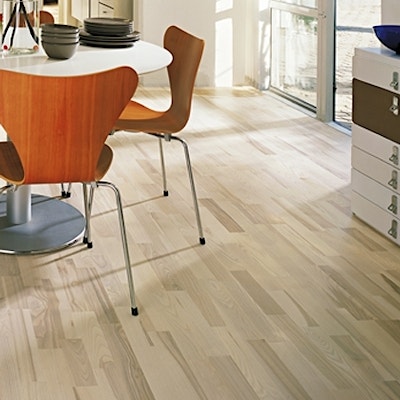
Material composition*Wood/Wood Fiber 93-94% [Amino Based Glue 2.6-3%, Carbamide Adhesive 1.0-2%, Lacquer Sherwin-Williams 0.8-1%, Filler 0.1%, Polyvinyl Acetate (PVA) 0.08-0.1%], Polyolefin Foam Plastic 0.4-0.5%, Polyester Foam - Bottom 0.5-0.5% *as reported by the manufacturer AVAILABLE SIZING72’’x 6 1/4” Plank; 3/8", 5/8", or 3/4" Thickness COLORSAvailable in a variety of wood species CERTIFICATIONS & DISCLOSURES
Health Product Declaration (HPD)
Declare Label
Environmental Product Declaration (EPD)
Safety Data Sheet (SDS)
USDA Certified Biobased Product Label
Other
FSC | Chain of Custody Certification
FloorScore
Nordic Swan Ecolabel
Additional DocumentsLast UpdatedApril 01, 2024 |
| Kaswell Flooring System | Micro Edge Grain |
Micro Edge GrainUsed in Healthier Affordable HousingKaswell laminates wood flooring in a linear fashion in order to make their Micro Edge Grain floor. This product is durable and long lasting, and is free of VOCs and formaldehyde. CategoryWood Flooring, Engineered WoodManufacturerKaswell Flooring System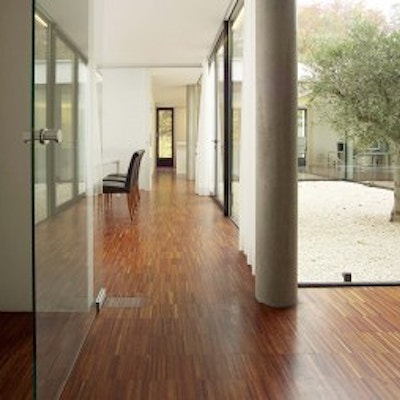
Material composition*Oak 20%, Plantation Recycled 80%, E1 Resin Glue, Solvent Free Urethane (undisclosed %) *as reported by the manufacturer AVAILABLE SIZING7”x 86.2” Plank COLORSAvailable in 6 different wood species CERTIFICATIONS & DISCLOSURES
Health Product Declaration (HPD)
Declare Label
Environmental Product Declaration (EPD)
Safety Data Sheet (SDS)
USDA Certified Biobased Product Label
Other
Additional DocumentsLast UpdatedApril 01, 2024 |
| Duracryl International | Corques Liquid Lino |
Corques Liquid LinoAvailable At the Donghia Materials LibraryLow-Embodied Carbon MaterialCorques Liquid Lino offers a revolutionary way to use linoleum. An alternative to traditional rolls and tiles, this product from Duracryl International is sold as a liquid and poured onto a subfloor onsite. It sets overnight at ambient temperatures to create a seamless durable and natural looking resilient floor. Corques Liquid Lino is made from vegetable oil, cork, wood-flour, limestone, and natural color pigments. It is free of VOCs, PVC, plasticizers, formaldehyde, chlorine, and heavy metals. Per Duracryl's EPD, this product meets HML's criteria for low embodied carbon. CategoryResilient, LinoleumManufacturerDuracryl International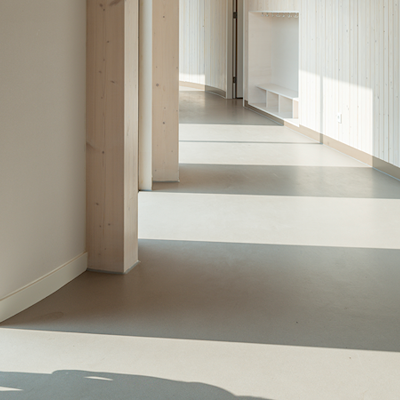
Material composition*Binder with MDI Activator: Castor Oil, Linseed Oil; Filler: Calcium Carbonate, Quercus Suber Bark; Pigment: C.I. Pigment Yellow 42, Dilron Trioxide, Iron Oxide (Fe304), Titanium Dioxide; Finish: Polyurethane *as reported by the manufacturer AVAILABLE SIZINGN/A (Poured Material) COLORSAvailable in 54 Colors CERTIFICATIONS & DISCLOSURES
Health Product Declaration (HPD)
Declare Label
Environmental Product Declaration (EPD)
Safety Data Sheet (SDS)
USDA Certified Biobased Product Label
Other
Declare | Red List Free
Last UpdatedMarch 25, 2024 |
| mafi | Natural Wooden Flooring |
Natural Wooden FlooringAvailable At the Donghia Materials LibraryLow-Embodied Carbon Materialmafi is an Austrian company that specializes in the production of three-layer wooden planks that can be used as flooring, walls, or ceilings. mafi floors are finished using natural oils. Instead of creating a seal-like more typical lacquers, the oil soaks into the wood and protects it from the inside out. Because it does not create a barrier, the oil finish on mafi’s wood floors allows the material to breathe and to help regulate the interior climate and improve indoor air quality. The natural oil finish is also free of toxic solvents. All of the wood used in mafi's flooring is grown in Austria, within 12km ( 8 miles ) of the factory. Per Mafi's product-specific EPDs, this product meets HML's criteria for low embodied carbon. CategoryWood Flooring, Engineered WoodManufacturermafi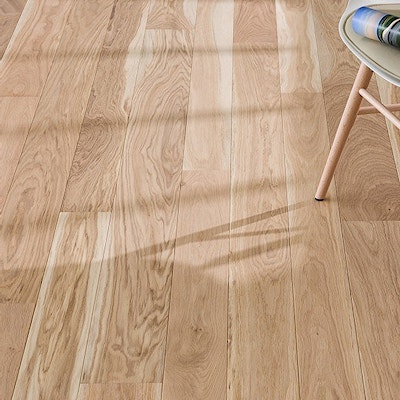
Material composition*Wood 99.9%, Polyvinyl Acetate Adhesive 0.05%, Natural Oils 0.05% *as reported by the manufacturer AVAILABLE SIZINGAvailable in a range of plank sizes COLORSOak, beech, ash, maple, walnut, acacia, spruce, larch, swiss stone pine, douglas fir, fir CERTIFICATIONS & DISCLOSURES
Health Product Declaration (HPD)
Declare Label
Environmental Product Declaration (EPD)
Safety Data Sheet (SDS)
USDA Certified Biobased Product Label
Other
Last UpdatedApril 01, 2024 |
| HempWood | HempWood |
HempWoodAvailable At the Donghia Materials LibraryHempWood is a hardwood alternative composed of hemp, soy flour, and binders (without isocyanates). As an engineered flooring product, the base is Columbia Forest purebond plywood. HempWood is harder than oak, and a durable wood option that promotes the carbon sequestering hemp-growing industry. All hemp for this product is grown locally in the U.S. and the entire supply chain is within a 100-mile radius of Murray, Kentucky. It contains 98% Biobased Content and has been awarded the USDA Certified Biobased Product Label in the BioPreferred® Program. Hempwood has a Janka hardness rating of 2,750. HempWood products are available either with a factory finish or unfinished. Wax or oil are suggested healthier options for unfinished floors. Check out Alternative Finishes in HML’s Healthier Design Alternatives. CategoryWood Flooring, Engineered WoodManufacturerHempWood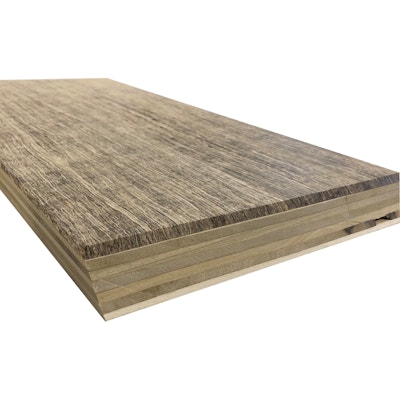
Material composition*Hemp >80%, Soy <15%, cured resin <5% *as reported by the manufacturer AVAILABLE SIZING5/8 X 5 X 48” for flooring COLORSunfinished, prefinished, bourbon CERTIFICATIONS & DISCLOSURES
Health Product Declaration (HPD)
Declare Label
Environmental Product Declaration (EPD)
Safety Data Sheet (SDS)
USDA Certified Biobased Product Label
Other
USDA Certified Biobased Product Label
Last UpdatedApril 01, 2024 |
| Tarkett | Linofloor xf² |
Linofloor xf²Low-Embodied Carbon MaterialThe newly released Tarkett Linofloor xf² flooring (specifically "Veneto") replaces the Harmonium line, previously listed by HML. This linoleum product avoids toxic heavy metals, PVC, PFAS, urea-formaldehyde, phthalates, and halogenated flame retardants. Some pigments used hopefully can be replaced with healthier alternatives soon. Tarkett offers a take-back program for their products and offcuts are 100% recyclable. Lino xf² is a glue-down linoleum - be sure to select a healthier adhesive option when installing this product. Per Tarkett's product-specific EPDs, it's Linofloor xf₂ lines meet HML's criteria for low embodied carbon. Some thicknesses come with a polyurethane backing, it's best to avoid these as that increases its carbon impact. It contains 100% Biobased Content and has been awarded the USDA Certified Biobased Product Label in the BioPreferred® Program. CategoryResilient, LinoleumManufacturerTarkett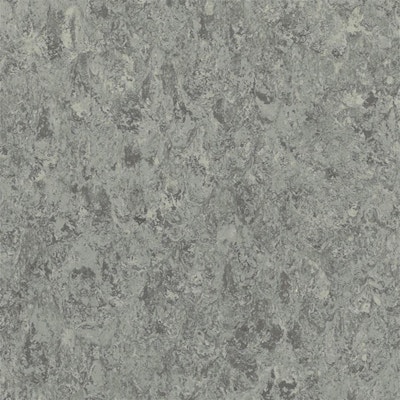
Material composition*calcium carbonate 21.591-24.274%, cellulose 5-24.8%, cork flour 5-24%, lignin 5-24.8%, linseed oil 1.671-2.802%, cork flour 0.641-1.657%, wood flour 0.642-1.657%, wood flour 0.642-1.657%, jute 0.518-0.869%, titanium dioxide 0.299-0.419%, polyurethane acrylic copolymer <0.666%, colophony 0.262-0.44%, carbon black <0.133%, iron oxide <0.133%, pigment red 101 <0.133%, pigment yellow 42 <0.133%, linseed oil 27.4%, rosin 4.3%, juts 8.5%, titanium dioxide 4.1%, C.I. pigment yellow 42 <0.2%, carbon black <0.2%, iron oxide <0.2%, iron oxide (Fe304) <0.2%, polyurethane acrylic copolymer <1% *as reported by the manufacturer AVAILABLE SIZINGRoll 6.5' x ≤ 100', 2.5mm thick COLORS66 CERTIFICATIONS & DISCLOSURES
Health Product Declaration (HPD)
Declare Label
Environmental Product Declaration (EPD)
Safety Data Sheet (SDS)
USDA Certified Biobased Product Label
Other
Cradle to Cradle | Gold
USDA Certified Biobased Product Label
Last UpdatedApril 01, 2024 |
| Duracryl International | Durabella Terrazzo |
Durabella TerrazzoAvailable At the Donghia Materials LibraryLow-Embodied Carbon MaterialDurabella Terrazzo flooring is composed of marble aggregates and/or natural stones with a vegetable oil-based binder. This healthier alternative to epoxy flooring is Red List Free and passes VOC emissions standards for the level of Indoor Air Comfort. While the production of this product currently requires the use of isocyanates, the manufacturer avoids the more harmful toluene diisocyanate (TDI). Proper protection during installation is advisable at all times. Durabella is customizable and can be applied to interior and exterior surfaces. Per Duracryl's EPD, this product meets HML's criteria for low embodied carbon. CategoryResilient, BiobasedManufacturerDuracryl International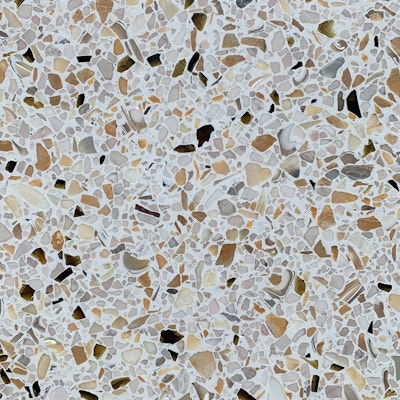
Material composition*Binder 50-80% with HDI Activator (2-Oxepanone, Polymer with 2-ETHYL-2-(HydroxyMethyl)-1,3-Propanediol 50%; Vegetable Oil 50%); Calcium Carbonate Filler 2.5-11.7%; Pigment 0.4-0.8% (C.I. Yellow 42 25%; Diiron Trioxide 25%; Iron Oxide 25%; Titanium Oxide 25%); Polyurethane 0.3% *as reported by the manufacturer AVAILABLE SIZINGcustom poured CERTIFICATIONS & DISCLOSURES
Health Product Declaration (HPD)
Declare Label
Environmental Product Declaration (EPD)
Safety Data Sheet (SDS)
USDA Certified Biobased Product Label
Other
Additional DocumentsLast UpdatedApril 01, 2024 |
| Forbo Flooring Systems | Marmoleum Signature |
Marmoleum SignatureUsed in Healthier Affordable HousingLow-Embodied Carbon MaterialMarmoleum Signature tiles are made from natural materials. The product has a low carbon footprint, and is free from toxic materials such as phthalates. The modular tiles allow you to mix and match patterns to design a unique floor surface. They can also be custom designed as long as they fit in one of the modular tile sizes. Per Forbo's product-specific EPDs, these Marmoleum flooring system meets HML's criteria for low embodied carbon. CategoryResilient, LinoleumManufacturerForbo Flooring Systems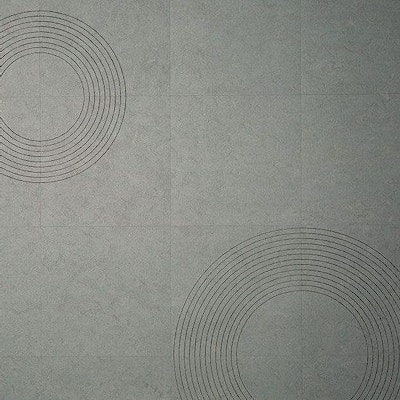
Material composition*Linseed Oil 20%, Gum Rosin 2%, Tall Oil 6%, Wood Flour 31%, Calcium Carbonate 8%, Reused Marmoleum 23 %, Titanium Dioxide 3%, Various other pigments 1%, Polyester 5%, Lacquer 1% *as reported by the manufacturer AVAILABLE SIZING9.8”x 19.69” and 19.69”x 19.69” Tiles COLORSAvailable in a variety of colors and designs CERTIFICATIONS & DISCLOSURES
Health Product Declaration (HPD)
Declare Label
Environmental Product Declaration (EPD)
Safety Data Sheet (SDS)
USDA Certified Biobased Product Label
Other
Declare | Red List Free
Contributes to LEED credits
Additional DocumentsLast UpdatedApril 01, 2024 |
| Forbo Flooring Systems | Marmoleum Imagine |
Marmoleum ImagineUsed in Healthier Affordable HousingLow-Embodied Carbon MaterialMarmoleum Imagine is made from natural materials and uses an Aquajet cutting technique to create the unique designs. The product has a low carbon footprint, and is free from toxic materials such as phthalates. The designs can be customized on request which allows for endless design possibilities. Per Forbo's product-specific EPDs, these Marmoleum flooring system meets HML's criteria for low embodied carbon. CategoryResilient, LinoleumManufacturerForbo Flooring Systems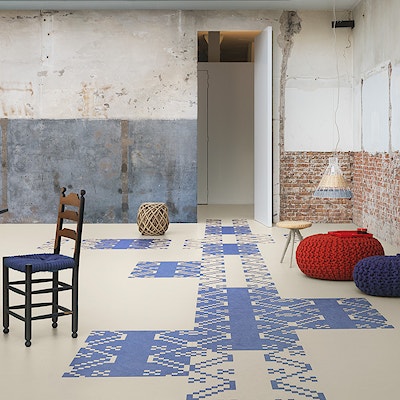
Material composition*Linseed Oil 19%, Gum Rosin 2%, Tall Oil 9%, Wood Flour 24%, Calcium Carbonate 23%, Reused Marmoleum 11%, Jute 8%, Titanium Dioxide 2%, Various other pigments 1%, Lacquer 1% *as reported by the manufacturer AVAILABLE SIZING2.5mm x 32m rolls, 2mm x 32m rolls COLORSAvailable in a variety of colors and designs CERTIFICATIONS & DISCLOSURES
Health Product Declaration (HPD)
Declare Label
Environmental Product Declaration (EPD)
Safety Data Sheet (SDS)
USDA Certified Biobased Product Label
Other
Declare | Red List Free
Contributes to LEED credits
Last UpdatedApril 01, 2024 |
| Forbo Flooring Systems | Impressa |
ImpressaAvailable At the Donghia Materials LibraryLow-Embodied Carbon MaterialImpressa has a natural base made from renewable raw materials very similar to linoleum. A state-of-the-art printing technique allows prints directly on the substrate for a range of authentic wood looks. The product composition is free from PVC, phthalates, and styrene. Note: Aluminum Trihydrate is used as a fire retardant to exceed requirements for flame spread and smoke development by international fire testing standards. (see footnote) Per Forbo's product-specific EPDs, this flooring system meets HML's criteria for low embodied carbon. CategoryResilient, LinoleumManufacturerForbo Flooring Systems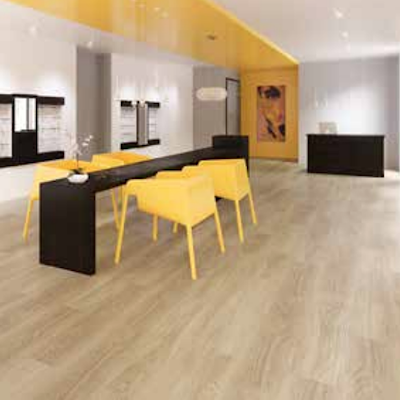
Material composition*Linseed Oil 18%, Gum Rosin 2%, Tall Oil 9%, Aluminum Trihydrate 21.5%, Wood Flour 18%, Reused Marmoleum 16%, Calcium Carbonate 6%, Lacquer/Sealer 4.45%, Polyester 3.8%, Print Ink 0.95% *as reported by the manufacturer AVAILABLE SIZING39.4 in x 9.8 in x 0.1 in panels COLORSAvailable in a variety of colors and designs CERTIFICATIONS & DISCLOSURES
Health Product Declaration (HPD)
Declare Label
Environmental Product Declaration (EPD)
Safety Data Sheet (SDS)
USDA Certified Biobased Product Label
Other
Declare | Red List Free
Contributes to LEED credits
Last UpdatedJuly 13, 2023 |
| Shaw Contract | Innate + In Tandem |
Innate + In TandemLow-Embodied Carbon MaterialShaw’s Innate + In Tandem are biobased flooring products composed of up to 50% vegetable oils. These include canola, rapeseed and castor oils. The floor compositions avoid orthophthalates, chlorine and solvents, and are FloorScore certified for low VOC. They are Cradle to Cradle certified SILVER and are Greenhealth Approved from Healthcare without Harm. Shaw’s biobased products are healthier alternatives for LVT, however, isocyanates still occur within the polyurethane processing method. Per Shaw's product-specific EPDs, this product line meets HML's criteria for low embodied carbon. CategoryResilient, BiobasedManufacturerShaw Contract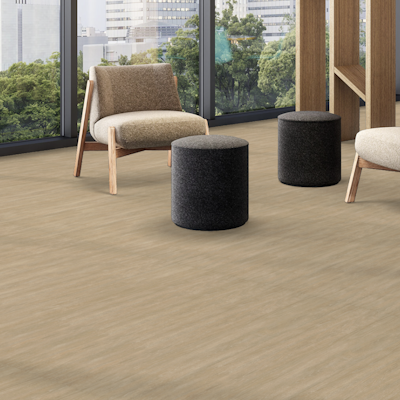
Material composition*Calcium Carbonate 40-59%, Biobased Polyurethane 30-50%, Aluminum Trihydrate 1-5%, Zeolite 1-5%, Undisclosed 0.5-1%, White Mineral Oil 0.2-0.5%, Fiberglass 0-3%, PET 0-3%, Polypropylene 0-3%, Cellulose 0-2%, Clay 0-2%, Titanium Dioxide 0-0.1% *as reported by the manufacturer AVAILABLE SIZING13 in x 26 in CERTIFICATIONS & DISCLOSURES
Health Product Declaration (HPD)
Declare Label
Environmental Product Declaration (EPD)
Safety Data Sheet (SDS)
USDA Certified Biobased Product Label
Other
Cradle to Cradle | Silver
FloorScore
Last UpdatedApril 01, 2024 |
| Patcraft | Ecosystem |
EcosystemAvailable At the Donghia Materials LibraryLow-Embodied Carbon MaterialShaw’s Patcraft’s Ecosystem are biobased flooring products composed of up to 50% vegetable oils. These include canola, rapeseed and castor oils. The floor compositions avoid orthophthalates, chlorine and solvents, and are FloorScore certified for low VOC. They are Cradle to Cradle certified SILVER and are Greenhealth Approved from Healthcare without Harm. Shaw’s biobased products are healthier alternatives for LVT, however, isocyanates still occur within the polyurethane processing method. Per Shaw's product-specific EPDs, this product line meets HML's criteria for low embodied carbon. CategoryResilient, BiobasedManufacturerPatcraft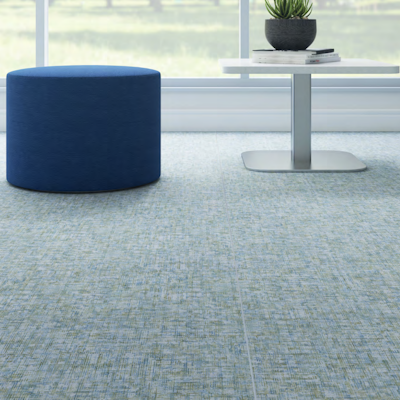
Material composition*Calcium Carbonate 40-59%, Biobased Polyurethane 30-50%, Aluminum Trihydrate 1-5%, Zeolite 1-5%, Undisclosed 0.5-1%, White Mineral Oil 0.2-0.5%, Fiberglass 0-3%, PET 0-3%, Polypropylene 0-3%, Cellulose 0-2%, Clay 0-2%, Titanium Dioxide 0-0.1% *as reported by the manufacturer AVAILABLE SIZING13 in x 26 in CERTIFICATIONS & DISCLOSURES
Health Product Declaration (HPD)
Declare Label
Environmental Product Declaration (EPD)
Safety Data Sheet (SDS)
USDA Certified Biobased Product Label
Other
Cradle to Cradle | Silver
FloorScore
Last UpdatedApril 01, 2024 |
| Forbo Flooring Systems | Forbo MCT |
Forbo MCTUsed in Healthier Affordable HousingAvailable At the Donghia Materials LibraryLow-Embodied Carbon MaterialMarmoleum MCT tiles are made from natural materials such as linseed oil and rosin. The product is free from toxic materials such as phthalates. The modular tiles allow you to mix and match to design a unique floor surface. This product has a slightly thinner gauge at 2.0mm. Marmoleum MCT is 100% biobased according to Biopreferred.gov. Per Forbo's product-specific EPDs, this Marmoleum flooring system meets HML's criteria for low embodied carbon. CategoryResilient, LinoleumManufacturerForbo Flooring Systems
Material composition*Limestone 24.78 - 25.78%, Wood Flour 24.28 - 25.28%, Linseed Oil 23.1 - 24.1%, Tall Oil 7.76 - 8.76%, Polyethylene Terephthalate (PET) 7-8%, Gum Rosin 4.04%, Various Pigments 1% *as reported by the manufacturer AVAILABLE SIZING13.11 in x 13.11 in x 0.08 in CERTIFICATIONS & DISCLOSURES
Health Product Declaration (HPD)
Declare Label
Environmental Product Declaration (EPD)
Safety Data Sheet (SDS)
USDA Certified Biobased Product Label
Other
Last UpdatedApril 01, 2024 |
| Daltile | Articulo |
ArticuloUsed in Healthier Affordable HousingAvailable At the Donghia Materials LibraryArticulo is a line of porcelain tiles that are designed to look like vein-cut travertine. This product is made in the U.S. and contains both post-consumer and pre-consumer recycled material. It is comprised of just 6 materials that are converted into benign, fully vitrified porcelain during the firing process. The majority of these tiles are produced in Muskogee, OK making this best suited for projects in the southeastern United States. CategoryTile, PorcelainManufacturerDaltile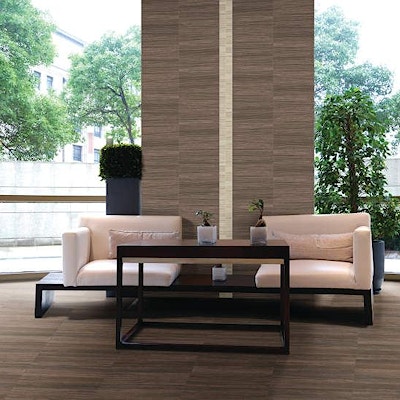
Material composition*Kaolin clay 20-55%, Nepheline Syenite 0-50%, Talc 0-40%, Feldspar 0-15%, Mica 0-5%, Quartz 0-30% *as reported by the manufacturer AVAILABLE SIZING1x3 in, 6x18 in, 12x24 in, 18x36 in COLORSEditorial White AR06, Feature Beige AR07, Story Brown AR08, Column Grey AR09, Headline Grey AR10 CERTIFICATIONS & DISCLOSURES
Health Product Declaration (HPD)
Declare Label
Environmental Product Declaration (EPD)
Safety Data Sheet (SDS)
USDA Certified Biobased Product Label
Other
Additional DocumentsLast UpdatedApril 01, 2024 |
| Daltile | Keystones |
KeystonesUsed in Healthier Affordable HousingAvailable At the Donghia Materials LibraryDaltile’s Keystones Collection is a colorbody porcelain mosaic line, suitable for indoor and outdoor use on floors, walls, as well countertops. A multitude of patterns allow for many expressive, aesthetic choices. The majority of these tiles are produced in Gettysburg, PA making this best suited for projects in the Northeastern United States. CategoryTile, PorcelainManufacturerDaltile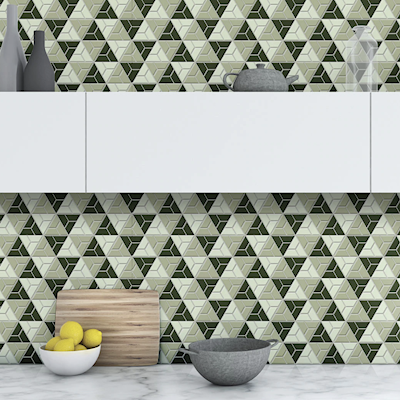
Material composition*Kaolin clay 20-55%, Nepheline Syenite 0-50%, Talc 0-40%, Feldspar 0-15%, Mica 0-5%, Quartz 0-30% *as reported by the manufacturer AVAILABLE SIZINGvarious mosaic patterns and sizes CERTIFICATIONS & DISCLOSURES
Health Product Declaration (HPD)
Declare Label
Environmental Product Declaration (EPD)
Safety Data Sheet (SDS)
USDA Certified Biobased Product Label
Other
Last UpdatedApril 01, 2024 |
| Windmoeller | Purline Wineo |
Purline WineoAvailable At the Donghia Materials LibraryPURLINE resilient flooring is made from bio-polyurethane, a high-performance composite material predominantly derived from vegetable oils such as rapeseed or castor oil and naturally occurring mineral components such as chalk. The flooring comes in various designs in sheet, tile and plank formats and requires no applied finish or coating. PURLINE is free of chloride, plasticizers, and solvents. This biobased product is a healthier alternative for LVT as it decreases the use of petrochemicals. Isocyanates still occur within the polyurethane processing method. CategoryResilient, BiobasedManufacturerWindmoeller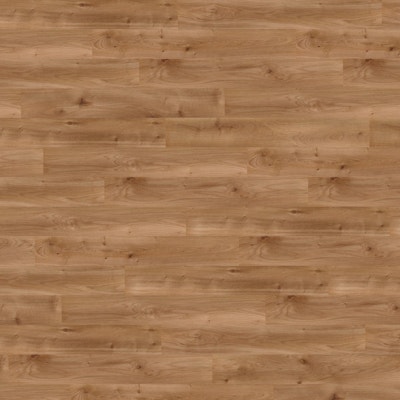
Material composition*Filler: Limestone 45-59%; Polymer: biobased Polyurethane Foams 30-50%; Filler: Zeolite 1-5%; Flame Retardant: Aluminum Hydroxide 1-5%; Film former: Cellulose 1-2%; Structure component: Continuous Filament Glass Fiber 1-3%, PET 1-3%, Polypropylene 1-3%, Kaolin 1-2%; Pigment: undisclosed 0.5-1%, Titanium Dioxide 0-0.1%; Defoamer: White Mineral Oil 0.2-0.5%. *as reported by the manufacturer AVAILABLE SIZINGavailable in planks, tiles, and rolls COLORSAvailable in over 150 designs CERTIFICATIONS & DISCLOSURES
Health Product Declaration (HPD)
Declare Label
Environmental Product Declaration (EPD)
Safety Data Sheet (SDS)
USDA Certified Biobased Product Label
Other
Last UpdatedApril 01, 2024 |
| Eco Safety Products | Eco-Tuff Clearcoat Finish |
Eco-Tuff Clearcoat FinishThe Eco-Tuff Clearcoat is an NIPU (non-isocyanate) biobased polyurethane finish. It can be used to seal wood or concrete and is available in a matte, satin or gloss sheen. It avoids VOCs and PFAS. It is CDPH VOC Emissions Certified and qualifies for both WELL and LEED. Acrylic acid is being used to form the polymers. Once chemically bonded, it is not harmful in end-use. It currently still contains petrochemical derived acrylic, but this will gradually be replaced by biobased alternatives and post less harm throughout its entire life cycle. CategorySealant / Surface, BiobasedManufacturerEco Safety Products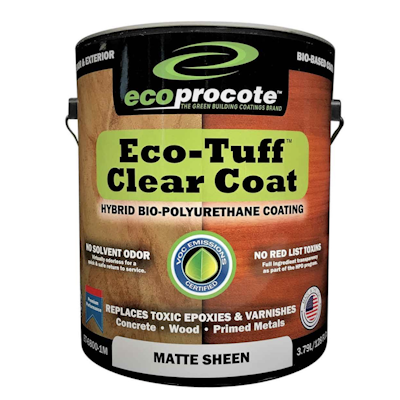
Material composition*Water, Acrylic Acid 3-(Trimethoxysilyl)Propyl Ester, 1,2 Benzisothiazol-3(2H)-One, Undisclosed, Starch Nitrate, Alcohols C9-11 Ethoxylated, Alcohols C16-18 Ethoxylated, Castor Oil Polymer with TDI, Triethylamine, 2-Propenoic Acid 2-Methyl-Polymer with Ethyl 2-Propenoate, Benzenesulfonic Acid Dodecyl-Branched Sodium Salt, Benzenamine N,N'-Methanetetraylbis[2,6-BIS(1-Methylethyl), Fatty Acids C16-18 and C18- Unsatd. ME Esters, Xanthan Gum, Surfactant-Specific Amines *as reported by the manufacturer AVAILABLE SIZING1 qt, 1 gal, 5 gal CERTIFICATIONS & DISCLOSURES
Health Product Declaration (HPD)
Declare Label
Environmental Product Declaration (EPD)
Safety Data Sheet (SDS)
USDA Certified Biobased Product Label
Other
Declare | Red List Free
Free of Red List Ingredients
Additional DocumentsLast UpdatedApril 01, 2024 |
| Eco Safety Products | Acri-Soy Penetrating Sealer |
Acri-Soy Penetrating SealerThe Acri-Soy Penetrating Wood and Concrete Sealer uses a hybrid acrylic and biobased emulsion technology. It penetrates into concrete and leaves no surface film. It can also be used to seal wood. It avoids VOCs and PFAS, it is CDPH VOC Emissions Certified and qualifies for WELL and LEED. The product is biopreferred certified. Acrylic acid is used to form the polymers. Once chemically bonded, it is not harmful in end-use. It currently still contains petrochemical-derived acrylic, but this will gradually be replaced by biobased alternatives and post less harm throughout its entire life cycle. CategorySealant / Surface, BiobasedManufacturerEco Safety Products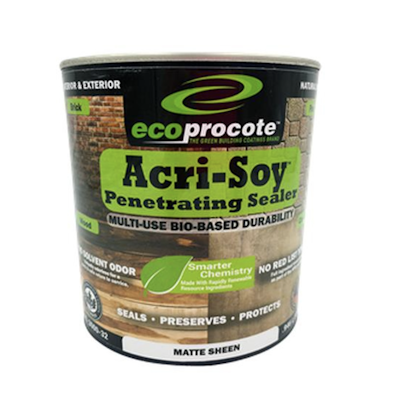
Material composition*Water, Acrylic Acid, 3-(Trimethoxysilyl)Propyl Ester, Ethanol, 2,2'-(Butylimino)bis, Undisclosed, Alcohols, C9-11, Ethoxylated, Alcohols, C16-18, Ethoxylated, Benzenesulfonic Acid, Dodecyl-Branched, Sodium Salt, Benzenesulfonic Acid, Mono-C10-16-Alkyl Derivs., Sodium Salts, Fatty Acids, C16-18 and C18-Unsatd., ME Esters, 2-Propenoic Acid, 2-Methyl-Polymer with Ethyl 2-Propenoate, Xantham Gum, Soybean Oil, ME Ester *as reported by the manufacturer AVAILABLE SIZING1 qt, 1 gal, 5 gal CERTIFICATIONS & DISCLOSURES
Health Product Declaration (HPD)
Declare Label
Environmental Product Declaration (EPD)
Safety Data Sheet (SDS)
USDA Certified Biobased Product Label
Other
Free of Red List Ingredients
Last UpdatedApril 01, 2024 |
The products in this collection have all been evaluated holistically for their contents and performance. To be considered, a product must disclose at least 75% of its ingredients by weight. It should avoid the biggest health concerns (such as those indicated in the HML Spec guidance for this product category) or be third-party certified. For flooring, this means selecting products that are free of PVC and post-consumer recycled content.
Aluminium Hydroxide or Aluminum Trihydrate (ATH), CAS# 21645-51-2 is used as a flame retardant and a filler in many building products. As it is a Greenscreen BM-2, the Lab continues to watch the scientific evaluation of this substance.
Spec Guidance
Linoleum, cork, and natural rubber are preferable when selecting resilient flooring. These products are typically made from bio-based ingredients and more likely free of hazardous ingredients commonly used in materials like vinyl.
Avoid vinyl flooring. It tends to contain harmful plasticizers called phthalates. As studies show, phthalates can disrupt the endocrine system, the body’s system of regulating hormones. The vinyl chloride monomer in PVC (polyvinyl chloride) is a known carcinogen.
Note: In 2015, leading home improvement retailers committed to actively avoid selling vinyl flooring that contain phthalates. A word of caution: Other plasticizers have been substituted and are not fully tested. (as reported by HBN, Mind the Store Press release. June 2019)
Be especially wary of post-consumer recycled vinyl. The recycling process mixes various types of vinyl products. Recycled vinyl may have lead, arsenic, toxic Polychlorinated biphenyls (PCB), and elevated levels of plasticizers in it.
Avoid post-consumer recycled rubber. Recycled rubber (also known as ‘crumb rubber’) is derived from recycled tires, and can contain harmful substances such as lead and hydrocarbon processing oils.
Avoid flooring made from polyurethane. Polyurethane contains isocyanates and can cause asthma and other respiratory problems.
Watch for VOCs from binders and adhesives in bamboo and engineered wood flooring.
Use trim screws instead of nails or adhesive. This method allows for flooring installation that will be disassembled within 10 years.
Be aware that unfinished wood flooring may be treated with biocides.
Opt for Reclaimed flooring. When made from healthy materials and found locally, it saves materials that would end up in landfills and reduces carbon emissions and health impacts.
Updated July 18, 2019
Related Videos
What's so Luxurious about LVT?
Luxury Vinyl Tile is taking over the world of flooring. Given that it is a synthetic plastic polymer, aka petrochemical product, one wonders how sustainable or healthy it can be? Find out more per latest research from a collaboration between the Center for Environmental Health, Material Research L3C and Autocase in this video session hosted by HML.
Related Tools and Guides
More Collections
Join Our Academic Network
Get Access to our carefully researched and curated academic resources, including model syllabi and webinars. An email from an academic institution or a .edu email address is required. If your academic institution does not use .edu email addresses but you would like to join the network, please contact healthymaterialslab@newschool.edu.
Already have an account? Log in